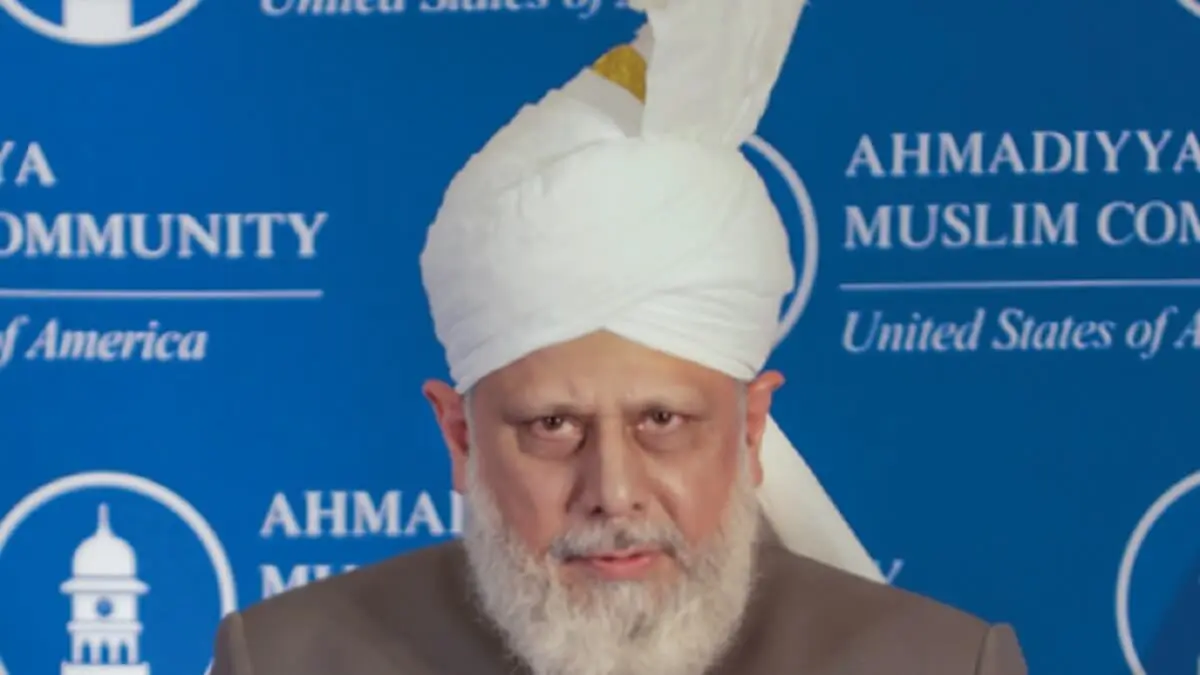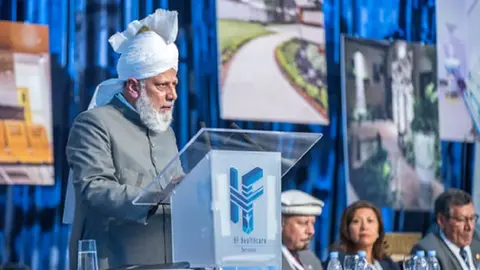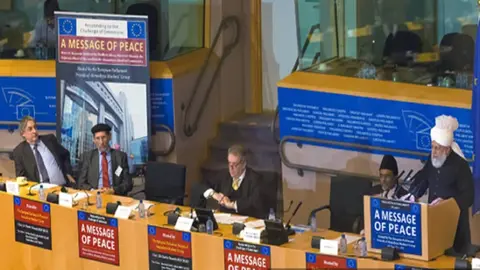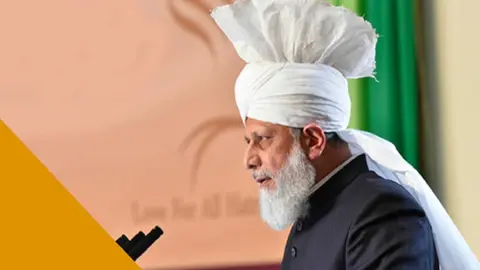Can Muslims live together in the West (II)?

[This is a continuation of the previous instalment: "Can Muslims live together in the West (I)?
Another situation that could arise would be, for example, if a Muslim-majority country and a Christian-majority country were to go to war for non-religious reasons. How should a Muslim citizen living in these countries, whether Christian or of any other religion, react to such circumstances? To answer this question, Islam has established a fundamental principle that people should never support cruelty or oppression. Therefore, if a Muslim country practises oppression or cruelty, they must be stopped from doing so; and if a Christian country practises cruelty, they must also stop their actions immediately.
How can a single individual stop his own country from any form of cruelty or oppression? The answer to this question is very simple. Democracy now prevails throughout the western world, and therefore, if a citizen (or group of people) sees that their government is acting in an oppressive manner, then they must raise their voice, oppose such measures and try to guide their country in the right direction. If a citizen feels that his country is violating the sovereignty of another country, then he should bring this to the attention of his government and awaken his conscience.
To stand up peacefully and expose the problems is not an act of rebellion or revolt, but is, in fact, an expression of true love for one's country. A citizen who cannot bear to see his country's reputation tarnished or disgraced within the international community, and who therefore draws attention to his country, is manifesting his love and loyalty to it.
As far as the international community and its institutions are concerned, Islam teaches that when one country is unjustly attacked, other nations should unite and try to stop the aggressor. If the aggressor nation realises its mistake and withdraws, no punishment should be imposed on it as revenge, or as a means of taking advantage of the situation. Therefore, Islam offers answers and solutions to all possible situations. The essence of the teachings of Islam is that we should spread peace, to the extent that the Holy Prophet Muhammad (lpbD) has defined a Muslim as a person from whose physical or verbal acts all others are safe.
As I have already said, Islam teaches that cruelty and oppression should never be supported. This is the beautiful wisdom-filled teaching that inspires a true Muslim to maintain a position of honour and dignity in the midst of whatever country he or she lives in. Surely all sincere and decent people would wish to have such peaceful people within their societies.
The Holy Prophet Muhammad (lpbD) has given Muslims another beautiful teaching to adopt in their lives. He has taught that a true believer should always seek what is good and pure. In turn, he also taught that whenever a Muslim hears wise advice he should adopt it in his daily life. Therefore, with the same determination with which a person seeks to acquire what is rightfully his, Muslims are taught that they should strive to obtain and benefit from wise counsel and goodness wherever it is found. It is a beautiful and perfect principle, much needed today when there are so many concerns about the integration of immigrants. In order to integrate into their local societies and develop mutual respect, Muslims are taught that they should try to learn all the positive aspects of every society, every region, every city and every country. It is not enough just to learn about these values, but Muslims must also strive to adopt them in their own lives. It is this guidance that truly instils unity, and the spirit of trust and mutual love. Indeed, who can be more peace-loving than a true believer, who in addition to fulfilling the demands of his faith, also tries to embrace all the positive aspects of his or any other society? Who can spread peace and security better than he?
Because of the means of communication available today, the world is now known as "the global village". This is something that the Holy Prophet Muhammad (lpbD) prophesied about 1,400 years ago, when he said that there would come a time when the world would be one and distances would seem to shorten. He said that, because of fast and modern means of communication, people would be able to see the whole world. In fact, this is a prophecy of the Holy Quran, which he himself explained in detail. Thus, the Holy Prophet (lpbD) taught that when such a time would come, people should try to learn and adopt the good things of others with the same enthusiasm with which they would try to recover their lost properties. In other words, it can be said that all positive things should be adopted, while all negative things should be avoided. The Holy Quran explains this commandment by saying that the true Muslim is one who enjoins good and forbids evil. With this in mind, what country or society would you say is not able to tolerate or accept the presence of Islam, or peace-loving Muslims, in its midst? Last year I had the opportunity to meet the mayor of Berlin and explained to him that Islam teaches that one should consider every positive aspect of any nation as if it were one's personal heritage. He responded by saying that if one were to act in accordance with this teaching, the whole world would certainly join hands and support this initiative. I am quite surprised and saddened when I hear that in some parts of Germany there are people who say that neither Muslims nor Islam can be integrated into German society. It is certainly true that Islam as represented by extremists or terrorists does not have the capacity to integrate into any country or society, and not only in Germany. Certainly there will come a time when voices of opposition to such extremist ideologies will be raised, even in Muslim countries themselves. However, the true Islam, the one presented to us by the Holy Prophet Muhammad (lpbD), will always attract sincere and decent people. In this age, to revive the original teachings, Al'lah (God Almighty) sent the Promised Messiah (lpD) as a servant of the Holy Prophet (lpbD), and the Community he founded and which I represent, practices and preaches the true message of Islam.
Let it be clear, therefore, that no one can fairly claim that true Islam cannot be integrated into any society. True Islam promotes justice and goodness, and shuns all forms of evil and crime. True Islam teaches Muslims to put an end to evil and cruelty wherever it exists.
Therefore, rather than a question of lack of integration, true Islam naturally attracts society, just as a magnetic magnet does. Islam teaches that a person should not only strive to acquire or desire peace for himself, but should make a wholehearted effort to spread peace and harmony among others, with the same yearning that he feels for himself. This selfless attitude is the way to establish peace in the world. Is there any society that does not appreciate these teachings and does not approve of this kind of approach? Surely a good society cannot wish immorality and evil to spread within it, and would never object to the promotion of goodness and peace in its midst.
When defining "goodness" there may be differences in the definition of goodness between a religious person and a non-religious person. Among the aspects of goodness and virtue that Islam describes, there are two primary virtues through which all other forms of goodness emanate. One is the obligation we owe to Almighty Al'lah, and the other is the responsibility towards humanity. Although there is a difference in the definition offered by a religious versus a non-religious person, there is no difference in the second aspect: the obligation towards human beings. The responsibilities due to Al'lah relate to the worship of God, and consequently, all religions guide their followers in relation to that worship; while as far as the rights of man are concerned, both societies and religion have taken it upon themselves to jointly educate mankind in this regard. Islam speaks in great depth and detail about the rights and obligations of human beings. As it is impossible to attempt to cover all of these teachings in the short time available to me, I will, however, mention some of the fundamental rights that Islam establishes, which are necessary for peace to germinate within society.
(lpbD) - peace and blessings of God be upon him.
(lpd) - peace be upon him.
(We will continue this discourse in the next installment: "Can Muslims live together in the West (III)").




